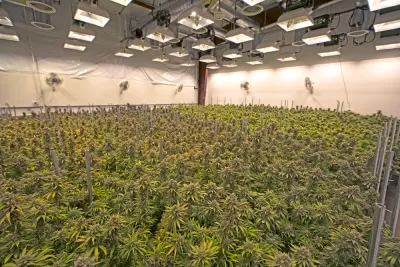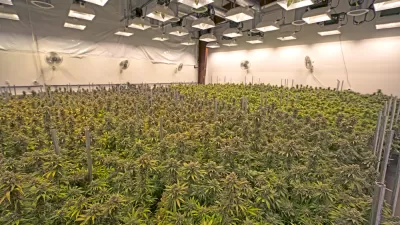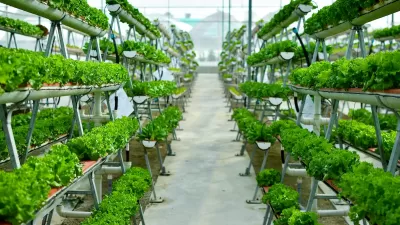After Washington legalized marijuana in 2012, an indoor cultivation industry has grown to a sizable presence in the state's environmental footprint.

John Stang reports on the surprisingly large environmental footprint of the nascent indoor marijuana cultivation industry in the state of Washington.
A new report by the Northwest High Intensity Drug Trafficking Area—the second if its kind since the state legalized recreational marijuana sales in 2012—presents a somewhat surprising portrait of marijuana cultivation, both legal and illegal, around the state.
"Marijuana growers and processors use 1.63 percent of the state’s electricity," writes Stang, which is enough electricity to power 2 million homes. "The carbon footprint, according to the report, equals that of about 3 million cars," adds Stang. There are more environmental impacts of the industry, such as the huge amount of water being siphoned off for grow operations and the encroachment of illegal grow sites on state-owned public lands.
Stang also shares some of the public health safety statistics included in the report.
FULL STORY: Washington’s pot industry isn’t as green as you’d think

Planetizen Federal Action Tracker
A weekly monitor of how Trump’s orders and actions are impacting planners and planning in America.

DARTSpace Platform Streamlines Dallas TOD Application Process
The Dallas transit agency hopes a shorter permitting timeline will boost transit-oriented development around rail stations.

Congressman Proposes Bill to Rename DC Metro “Trump Train”
The Make Autorail Great Again Act would withhold federal funding to the system until the Washington Metropolitan Area Transit Authority (WMATA), rebrands as the Washington Metropolitan Authority for Greater Access (WMAGA).

Supreme Court Ruling in Pipeline Case Guts Federal Environmental Law
The decision limits the scope of a federal law that mandates extensive environmental impact reviews of energy, infrastructure, and transportation projects.

Texas State Bills to Defund Dallas Transit Die
DART would have seen a 30% service cut, $230M annual losses had the bills survived.

Bikeshare for the Win: Team Pedals to London Cricket Match, Beats Rivals Stuck in Traffic
While their opponents sat in gridlock, England's national cricket team hopped Lime bikes, riding to a 3-0 victory.
Urban Design for Planners 1: Software Tools
This six-course series explores essential urban design concepts using open source software and equips planners with the tools they need to participate fully in the urban design process.
Planning for Universal Design
Learn the tools for implementing Universal Design in planning regulations.
Roanoke Valley-Alleghany Regional Commission
City of Mt Shasta
City of Camden Redevelopment Agency
City of Astoria
Transportation Research & Education Center (TREC) at Portland State University
US High Speed Rail Association
City of Camden Redevelopment Agency
Municipality of Princeton (NJ)





























